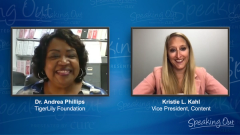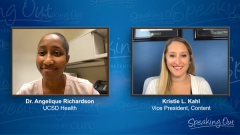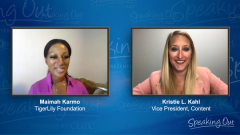
Addressing Disparities in Breast Cancer
CURE spoke with Maimah Karmo, founder and CEO of the Tigerlily Foundation, about disparities in breast cancer care, and how they are being addressed.
Kristie L. Kahl: Can you just discuss the disparities that we are seeing in breast cancer right now?
Maimah Karmo: There are so many black women who are dying almost twice the rate of their white counterparts. For one, we have more aggressive breast cancers, we're not as involved or asked to be in clinical trials. And there's so much fear around the bias that people have experienced in healthcare and science that there a lot of barriers to care.
And so we're seeing issues around barriers that are financial, geographical, systemic barriers, various around mistrusting physicians as well. And just the overarching societal needs that we know women of color have right that inhibit them from having access, and are getting to care in a timely fashion. So, for example, some of our patients are living in communities where they don't have a train or a bus system, where they may be single parenting and have more than one child. And so if you're working an hourly wage job and have multiple kids, and you're a single parent, and you have to go to get your first screen, just getting done, and they call you back for a follow up screening, how do you choose between your children getting food to eat and paying for their light bill and their water bill to keep them safe and comfortable in getting care for yourself. And most mothers having to choose between their kids and themselves will choose their children.
So it really is a problem because again, most single family households are African American households. So looking at those disparities, why they exist, and figuring out how to eliminate them, it's been a really big issue for us as an organization. I'm really working to help people understand what we're facing, and how we can work together with partners and pharma. In the government, you know, in other advocacy groups to really overcome, those are a key focus for us.
Kristie L. Kahl: What other challenges are we seeing in breast cancer, whether it be in the diagnosis, its treatment, or even beyond?
Maimah Karmo: I think that finding ways to treat women of color is really important. As you know, women of color have not been engaging in been asked to be in trials as much. And we're seeing a lot more engagement around how to reach a black woman for recruitment of clinical trials. So I'm hoping that there's promise, which I think is on the horizon, to be able to get more black woman in trials to be able to have better treatment outcomes for that population. I think also because of what happened last year with COVID-19, in releasing how people dealt with being alone in the home, because when you're a patient, people can come and see you, but they are not living that experience with you, right, where you're in the house by yourself. And you're kind of, in a way isolated, but the whole world was also in that bubble last year. And so really giving people that mental health support is critical, and emotional support, they need to be able to navigate, not just the treatment journey, but also the mindset, how do you recover your mind after treatment? How do you get yourself back? How do you get your sexy back? Or your mojo back? Right? How do you feel confident in life? Again, how do you deal with the trauma of cancer, you know, because as patients, we've talked about this amongst ourselves for many years, my friends, and I discussed the trauma of cancer. But you know, people who haven't gone through cancer have no idea how traumatic cancer can be. And so just I think we have ways to go with getting people that mental health support, which is evolving. And again, whether you're black or white, just giving all patients that love and support, and mental health and support and giving caregivers that support as well. I also feel like it's been really great to see that we're getting more patients involved in curating programming for organizations, whether they're government agencies, or pharma or advocacy, it's been really powerful seeing the patient voice rise, and that people seeing patients as an equal expert, to their provider counterparts. So those are ways we I think they're that we're evolving and they're all good things. I look forward to being a part of that change within my organization and supporting patients as well along their journey.
Kristie L. Kahl: Are there resources that are available for individuals who might be experiencing these challenge or barriers that TigerLily has to offer?
Maimah Karmo: Yeah, so we have barrier toolkits. The barrier toolkits are tools that have been created with barriers for a black woman in mind. So the toolkits have been designed with the idea of like, here's what the barriers are for black woman in breast cancer. And then each one has been created, where it helps people understand what the barriers are that they're facing, and how to overcome the barriers, what to ask their doctor, what to ask about insurance about getting to and from treatment and or jail, what to ask about what to ask about how to protect work rights during, you know, during their whole treatment journey. So, the toolkits are really powerful.
We also offer Angel advocate training, or we train women about how to understand breast cancer and how to navigate the whole journey. Everything from you know, breast cancer, one on one to screening to follow up care, to mental health survivorship to sharing your story. And, you know, advocacy, why it's important in terms of policy work as well in clinical trials is that the training runs the entire gamut of breast cancer, beginning to end. We also offer digital classes called are called our pure cat initiative, where we have physical activity classes like silver dancing, yoga, we have meditation, we have fitness as well, to help people who are home have access to, to activity and mental health support and engagement. Also, I think I mentioned the care coaching earlier and therapeutic support as well, financial assistance, and we do a lot of peer-to-peer engagement. So if anyone needs any kind of support, you can call our office and get kind of meet with our program managers to know what their needs are, and get routed to whatever that need may be. So what have I mentioned today on the call or this this presentation? Christine likers are one of our program managers. She can work with our patients to get them hold boxes to get them get their bills paid to get them with a peer and to just get them whenever they need to navigate through the breast cancer journey as a patient or a loved one of that patient.






